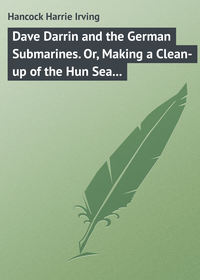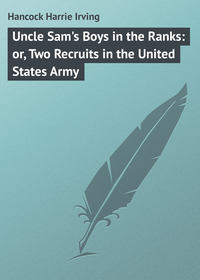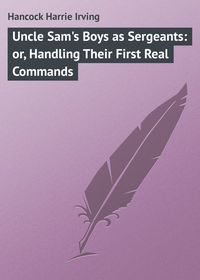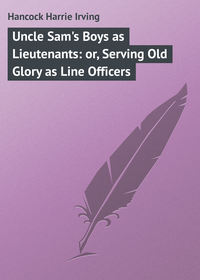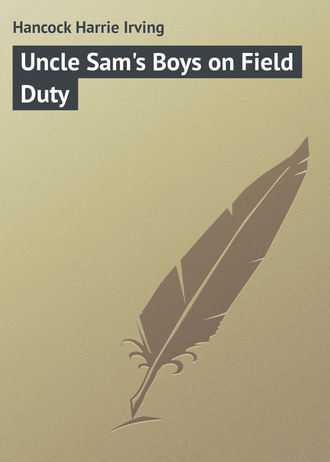 полная версия
полная версияUncle Sam's Boys on Field Duty
Captain Cortland tried the file lightly in some of the nicks in the bolt. Then he passed file and bolt over to Lieutenant Hampton.
"Mr. Hampton, don't these nicks seem to fit this file remarkably well?" queried the company commander.
"They appear to – very well, sir," replied Lieutenant Hampton, testing the file in the nicks.
"What do you say, Mr. Prescott?"
The young second lieutenant studied file and bolt attentively.
"I am obliged to agree, Captain, with yourself and Mr. Hampton."
"Private Overton, think again. Do you still care to deny that you employed the file on the bolt of your rifle?"
"I deny it, sir, with all the emphasis of which I am capable," was Hal's earnest retort. His face was flushed, his breath came quickly, but he looked straight and honestly into his commander's eyes. There was no cringing in his attitude. His high color was to be attributed only to the humiliation of the position in which he found himself.
"And this bolt has been in the fire," continued Captain Cortland. "Just such a fire, let us say, as you build three times a day for the preparation of your food. The temper of the end of the bolt is ruined."
"Yes, sir. May I speak, Captain?"
"Go on, Overton."
"Captain Cortland, I am aware how badly this looks for me. But I assure you, sir, on my honor as a soldier, that I have no guilty or other knowledge of how the bolt came to be in this fearful condition. I am entirely innocent, sir, of any act that could have put the bolt in such condition."
"You are not guilty even of negligence, Overton?"
"Not of any intentional negligence, sir."
"Then, Overton, you must have some sort of suspicion of how this thing happened."
"I have a suspicion, Captain, but it is not founded on anything that is yet very tangible, sir."
"You think it an enemy's work?"
"Yes, sir. None but an enemy could do such a thing as this to a comrade's rifle."
"Granted, but who is the enemy?"
"May I be excused, sir, from answering?" asked Private Overton very respectfully.
"Why?"
"Because it is quite possible that, in naming an enemy, I may do some honest soldier an injury."
"You need not answer, then, Overton. Wait here."
Captain Cortland stepped down from the small boulder on which he had been seated. At a sign from him Lieutenant Hampton walked away with the company commander. The two remained for some moments in low conversation.
"Overton!" summoned Captain Cortland, returning.
Hal saluted.
"This affair looks badly for you, and I want it to be a lesson to you hereafter. You have had an excellent record, Overton, since you joined the regiment. For this time I am going to take your word that you are ignorant of how the accident to your rifle bolt happened. So you are now released from arrest, and will rejoin your company. If you suspect that any comrade is guilty of this outrage on your bolt, I recommend that you keep your eyes open for any further attempts against your record. Corporal Cotter, you will not repeat what has been said here. Overton, you are released from arrest. Corporal, report yourself to the first sergeant as being on regular duty again."
Corporal and private sainted, then turned back to the company.
"You got off easily," murmured Noll, when his bunkie, with face white and eyes flashing, joined him.
"That's because Captain Cortland decided to take my word for my innocence in the matter," Hal replied cautiously.
"Now, see here, old fellow, you've got to be up and doing," urged Noll earnestly in a whisper.
"What can I do, now?" Hal asked.
"Keep your eyes peeled. You can find out, by and by, who was responsible for that low trick. Hal, you'll have to make vengeance your watchword."
"Revenge is sweet," mimicked Hal dryly.
"It surely is – sometimes."
"But sweet things make one sick at his stomach," Hal uttered dryly.
"Well, if you're going to stand for having a job like that put over on you," uttered Noll disgustedly, "I'm not! The fellow who did that trick to you isn't fit to be in the service, and I'm going to get him out of it, whether you help or not."
Separated from the young soldiers by only a thin ledge of rock, eavesdropping Hooper and Dowley heard, and gazed keenly at each other.
"We've got to frame things up for young Terry, too, then!" whispered Bill Hooper, as the sulky pair stole away.
CHAPTER IV
THE JOKING SCOUT
"CAN you see the enemy, Overton?"
"I can't see a thing, Corporal."
"Move forward cautiously. Don't make a sound. If you do you'll betray our position."
"How far shall I go, Corporal?"
"Move ahead until you run into signs of the enemy. Above all, bear in mind that you mustn't betray our presence to the enemy."
Private Hal Overton gripped his rifle tightly in the darkness as he all but wriggled forward over the ground.
It was all very real business to the soldiers engaged in this mimic warfare. If nothing more serious happened, any big mistake on the part of a soldier in this sham warfare would bring upon him the displeasure of his officers.
Late that same afternoon B Company had been attacked by lurking C Company. Some very clever manœuvring of the men under cover bad been done, and a good deal of blank ammunition had been fired. True, there had been no real casualties, but, under the rules of the game, B Company had made such a spirited and excellent defense that C Company had been driven further back.
Now the position of C Company was unknown, but the "enemy" was believed to be lurking in the vicinity, bent upon a night surprise.
Two thirds of B Company slept back in the camp of pup-houses. The other third, under command of Lieutenant Prescott, was divided up among sentries, outposts and scouts.
To Corporal Cotter had been entrusted the problem of taking a scouting party consisting of three privates and trying to locate either the enemy's outpost or the main body.
Just a moment before Hal's orders to prowl forward a sound had been heard, evidently about four hundred yards ahead.
So now Hal stole forward, moving as softly as any cat could have done, this despite the fact that his advance must be over jagged rocks here and there.
The ground was ideal for ambush fighting.
Hal now had a new rifle, that had been issued to him when the wagons of B Company came up late that night. The damaged piece was now in the wagon, and Hal bore a rifle on whose efficient action he could depend.
"It's almost a mockery to have a gun, though, just now," Hal smiled grimly as he lifted the piece over a ledge of rock and followed.
"Wouldn't I get a clever roasting from Captain Cortland if I dared to fire it while scouting."
Now Private Overton came to an open space where he could walk more easily. He did not hasten, however, for there was no telling when, in the darkness, he might step on a stone and send it rolling, with a resulting racket that would warn the enemy, if any of them were within hearing.
Every step had to be taken as though the troops were in the midst of life and death war. The rules of the game were strict, and any bit of bad judgment was likely to count against the score of the company to which the man belonged.
Every now and then the sham young scout halted, peering backward, for it was going to be of prime importance to him to know how to get back when his scouting trip was done.
"Halt! Who's there?"
Overton did halt, flattening himself down against the rock.
The hail, though softly spoken, had been unmistakable.
"Halt! Who's there?"
"You'll have to come here and find out," thought Overton.
Then, as silence followed, Hal, holding his very breath, crawled some ten yards to the left. Again he halted, but this time there was no faintly spoken challenge.
"I think I know where that fellow is," mused Hal. "Is he a lone sentry, or part of an outpost?"
It required fifteen minutes now of the most cautious procedure, but Private Overton at last found himself hugging the ground at a point from which he could just barely discern the dimly defined figure of an alert sentry against the skyline.
"I've got him between our camp and myself now," thought Hal swiftly. "Now I've got to be doubly careful. I don't care to have B Company laughing at me because I got captured while on scouting duty. But I'll settle the question of whether that sentry is alone, or part of an outpost."
Three minutes later, after some most careful manœuvring, Overton had solved the question. His grinning face was turned toward a corporal and two men who lay rolled in their blankets some ten yards behind the sentry.
"It's an outpost, all right," grinned Hal. "Whee! How I would like to bag the outpost and take them in as prisoners."
But that was out of the question – not to be thought of.
Private Hal Overton found himself seized by a spirit of mischief. It was the same type of impulse which, carried to the point of reckless daring in real warfare, leads men on to swift promotion.
Almost before he realized what he was doing Hal had hidden his own rifle and was crawling stealthily toward the sleeping men.
Beside the corporal lay his rifle. Barely breathing, his body flattened against the ground. Hal crept closer and closer, then stealthily withdrew the rifle.
A moment or two later Hal had the captured rifle lying on the ground beside his own.
"That's a real find to take back to camp," laughed Hal silently.
He was about to make off with the captured piece when a new impulse seized him.
"Why not go back after more loot?" he asked himself, grinning. "Jupiter, I'll do it!"
Every such move as this was fraught with added danger. But Hal moved on his stomach, taking plenty of time, always with his watchful eyes on the dim figure of the sentry a few yards away. That soldier, however, appeared to be peering mostly in the direction where he believed the camp of B Company to lie.
After a short time Hal, back in safety again, gloated over the sight of three rifles beside his own.
"I'll be a hog, if I don't look out!" chuckled the young scout of sham warfare.
Yet, though this was no life and death fighting, Private Overton had nevertheless a good deal at stake. It would result in his being set down as a rather stupid soldier should he be captured by the enemy's outpost while on scouting duty.
"I can't help it. I've got to have one more try, anyway," decided the mischievous soldier boy.
So back he crept. An instant later he tried to make himself flatter against the earth than he had been able yet to do.
For that sentry had now turned and was looking in his direction.
"I commit myself to the darkness," gasped Private Overton inwardly.
For, if his presence were detected, the sentry, with one call, could bring the other three sleeping men to their feet. Against such odds Hal would have but scant chance of getting away.
"And I'll have to leave my rifle behind if I duck from here," thought Hal, beginning to regret his rashness.
It was one thing to capture the rifles of the outpost; it was quite another thing to leave his own gun behind in their hands.
After a few moments of agony the dimly seen sentry again turned his face in another direction.
"Now that I've started this trick, I'll put it through or die," thought the soldier boy, setting his teeth.
Again he crouched close to the corporal and the two other sleepers. This time there appeared to be no loot loose save a pair of canteens that lay upon the ground. Private Hal Overton made sure of these articles, then, as he lay there, took a last sweeping look.
The shoes of Corporal Raynes, of C Company, protruded under the foot of his blanket.
"I guess it would be too risky a stunt to try to unlace the corporal's shoes and carry 'em away," quivered mischievous Hal, eyeing the footgear longingly.
Then, as he gazed, it struck the soldier boy that there was something odd about the position of the corporal's shoes with regard to the line of Raynes body.
"I wonder if – " cogitated Private Overton, edging himself forward.
Hal made a cautious try.
His last guess proved to be correct. Corporal Raynes had taken off his shoes to ease his aching feet, and had tucked them in at the bottom of his blanket.
"It's a shabby trick to play on a good fellow," grinned the soldier boy, "but this is war."
For the last time Hal crept back. Now an even greater task confronted him, and that was how to get away with all the outpost loot he had captured.
By making three stealthy trips, Private Overton at last succeeded in getting all the loot in safety to a point more than one hundred yards from the outpost.
"Now, it's time to drop nonsense for real business," decided the young scout.
Ten minutes later he had located the main camp, and that without falling into the hands of either of the two C Company sentries whom he was compelled to pass in the black night.
Then back to the hidden loot the young soldier returned.
"Whew, but that's going to be a pack!" muttered Hal, gazing at it almost ruefully. "However, I've got to take it. I won't leave a blessed thing behind."
The canteens Overton threw over his shoulders, so that he had one on each side, in addition to his own, which hung at his left hip. The corporal's shoes he tied to his belt. It was the bunching of the four service rifles, with their weight of more than forty pounds, that gave him his real trouble. But at last he had the four pieces lashed together and started.
"I've yet got to look out that I don't run into any scouts of the enemy," thought the soldier boy half ruefully. "Whew, what a break it would be to be picked up with all this loot!"
It was a welcome sound indeed when, at last, the young scout heard, near the spot where he had left his own party, the almost whispered challenge:
"Halt! Who's there?"
"Friend," responded Hal Overton in a tone no louder.
"Halt where you are, friend, until a sentry advances to recognize you," returned cautious Corporal Cotter.
It was the corporal himself who came forward.
"Great Scott, Overton, what have you – "
"It's loot," returned Hal proudly.
"Where on earth did you – "
"From the enemy's outpost. And I located the camp, too. I could guide you right to either outpost or main camp. Will you take these guns, Corporal? My back feels broken."
"I should think it might," was Cotter's grinning response, as he reached out and took the lashed rifles. "Great Scott! What won't the lieutenant and Captain Cortland say!"
Just as they stepped softly back, Private Noll Terry challenged someone approaching softly from the rear.
"Halt! Who's there?"
"Officer of the day," returned Lieutenant Prescott's low voice.
"Advance, officer of the day, to be recognized."
Lieutenant Prescott advanced into the group.
"Do you see all this stuff, Lieutenant?" asked Corporal Cotter, calling attention to Hal's loot as it lay on the ground. "Overton went forward as a scout, and located one of the enemy's outposts, also the main camp. And he brought back these souvenirs of the outpost."
"To whom do the shoes belong?" questioned Lieutenant Prescott after looking at the stuff.
"To Corporal Raynes, sir, in command of the outpost," returned the soldier boy, with a grin.
"How did you get hold of all this stuff, Overton?"
Hal told his story briefly.
"Great Scott! Bombshells and grenades, what a roaring joke on the enemy! Overton, you're a man worth having in B Company. Dark as the night is, your exploit would reflect credit on a trained Indian scout. Overton, I'm going to take you back to camp with me. I'll wake Captain Cortland to hear your report as to the enemy's position. And the captain will surely want to see this loot of the outpost and to hear your tale of how you got it. Here, let me have a couple of those rifles to carry for you."
Lieutenant Prescott led the way hack to B Company's camp. And he shook with laughter all the way.
CHAPTER V
THE CORPORAL WITH THE SHEEPISH GRIN
CAPTAIN Cortland heard the young scout's report without losing his gravity, though he decided against trying a night attack on the enemy beyond.
"Overton," he commented, "if you can do things like to-night's work very often there will be no doubt whatever that you have in you the making of a real genius for scouting. I commend you most heartily for this work."
It was only when he went back to his tent to lie down that Captain Cortland gave way to silent laughter.
At daybreak the camp was astir. The men who had been on guard duty and scouting through the night came in, somewhat heavy-eyed, after a relief had been marched out to take their places.
These returned soldiers, as soon as they had breakfasted, threw themselves on the ground, under such shade as they could find, and took an hour of solid sleep.
"The wagon train is approaching, sir," reported Sergeant Gray.
"Then pass the order for the men to report at the train and draw rations to last until to-morrow night," directed Captain Cortland. "After to-morrow night the two companies will be together again for the balance of the field work."
Lieutenant Prescott was acting as commissary officer for B Company, and he went immediately to the trail. Captain Cortland, stepping into his tent, buckled on his sword and then sauntered down to the wagon train to see that all went smoothly.
As he reached the spot where the soldiers of B Company were drawing their rations, Captain Cortland caught sight of a corporal perched on the seat beside the driver of one of the wagons.
"You here, Corporal Haynes?" demanded Captain Cortland, striving hard to preserve his official gravity.
Grinning sheepishly, Corporal Haynes – in his stocking feet – sprang down into the trail and saluted.
"Yes, sir," he admitted.
"Ill?"
"No, sir."
"Were you captured, then?"
"No, sir," answered Haynes, the sheepish look in his face increasing. "But I'm a non-combatant, sir; ruled out of the manœuvres and ordered to stay with the wagon train, sir."
"How did that happen?" inquired the captain, though he was able to make a very good guess.
"While I was on outpost during the night, sir, my shoes were taken from me. I suspect, sir, that one of your scouts got 'em."
"But we have quartermaster's supplies along. Why didn't you draw a new pair of shoes this morning?"
"No shoes of my size, sir, in the supplies," reported Raynes, once more saluting. "So Captain Freeman told me that I certainly couldn't fight in my stocking feet. Therefore, sir, he ordered me to join the wagon train and respect all the obligations of a non-combatant."
"Too bad, too bad, Corporal, for you are a valuable man," went on Captain Cortland.
"I don't feel like one this morning, sir, after having my shoes taken," grinned the C Company corporal in embarrassment.
"Well, since you've been ordered among the non-combatants," continued Cortland, after turning slightly and espying the grinning face of Private Hal Overton, "I think the scout who captured your shoes may as well return them. But hold on. I see two other men of your company on the wagons."
Again Corporal Raynes grinned sheepishly.
"Yes, sir! they had their rifles taken, and so are no longer combatants in a military sense. My rifle is missing also, sir."
"My, my, my!" murmured Captain Cortland in a tone of mock commiseration. "Then the scout who plundered you all may as well return all the property. But of course, Corporal, you and the two other men will continue to be non-combatants as long as the sham fighting lasts."
"Those are Captain Freeman's orders, sir."
Again Captain Cortland turned toward Hal Overton, nodding a signal. Hal stepped away briskly, but came back bearing the pair of shoes, the rifles and the canteens.
"Private Overton is the scout who entered your lines alone and brought about the discomfiture of C Company," Captain Cortland announced, smilingly.
The captain walked away while Corporal Raynes, sitting on the ground, drew on his shoes and laced them, while a lot of B Company's men stood about and grinned over his discomfiture.
"Corporal, you're sure good sleepers over in C Company," laughed Private Hyman. "You fellows want to look out that, some night, you don't get taken in by a lot of amateur hunters from New York."
"Great guns, what's going to happen to the regular Army, when it's getting so that a whole company of infantry can't guard its own property?" another B Company man wanted to know.
Corporal Raynes and his two comrades had to stand a lot of good-natured joshing from the crowding men of B Company.
When he stood up, Raynes turned to Hal Overton.
"Rookie," he growled, "you want to look out hard in the future. I'll pay you back for this in kind. Just remember, kid, that Corporal Raynes wasn't born yesterday!"
Hal laughed good-humoredly. He didn't know, at that moment, that not many hours would pass ere Corporal Raynes would find his opportunity.
Twenty minutes after the wagon train had pulled out, B Company started cautiously through the country ahead. It was B Company's task to advance through a supposedly hostile country; C Company's part in the under-taking was either to annihilate B, or to capture the company.
It was ten o'clock that morning ere B and C came in touch. The point and scouting squad ran into one platoon of C.
"Deploy your men and take cover," ordered Lieutenant Prescott, who was in charge of the advance. "Each corporal regulate the firing of his squad. Jam the fire in hard whenever you are sure you locate the enemy."
Bang! Bang! Bang! As fast as the squads reached their places on the line, each man some nine feet from his nearest fellows, the firing of blank ammunition ripped out fast and hard. There was all the excitement of actual warfare, except that no soldier was actually hit.
B Company's men would have been driven back had not Lieutenant Hampton swiftly arrived on the scene with the entire first platoon of B Company.
"We'll advance by rushes, Mr. Prescott," announced Lieutenant Hampton as soon as he reached the younger officer, who saluted.
Prescott hastened, crouching low, down along the left wing of the little command.
Presently Hampton's voice rose, even over the firing as it ran low, and called:
"Rise! Charge!"
Uttering their battle yell, the little force of infantry rushed forward in its thin line, while the hidden men of C Company poured in a heavy fire.
"Halt! Lie down!" shouted Lieutenant Hampton. "Ready, load, aim!"
There came a brief pause, followed by the order:
"Fire!"
A single volley crashed out, with such unanimity that it sounded as though one big piece had been fired.
"Ready! Open magazines! Load magazines! At will, commence firing!"
Fifteen rounds had been fired ere the bugler sounded furiously the order:
"Cease firing!"
The rush of feet sounded behind. Lieutenant Prescott rushed to the rear, but soon waved his sword reassuringly. It was the balance of B Company advancing on the run.
Captain Cortland now took command in person. He ordered another rush forward toward C Company's position.
Three volleys were fired after the rush. The fire was not answered. A cautious advance developed the fact that the force of C Company men had retired, nor could the line of their flight be discovered. B Company halted for a few moments, that the men might clean their sooty rifle chambers.
"We didn't really see the enemy," Hal remarked, as he worked his cleaning rod and a bit of waste through his gun barrel.
"In warfare nowadays you rarely do see the enemy," remarked Sergeant Hupner. "Attacking an enemy's position, nowadays, is a good deal like taking a gun and going into a dark room where some one is shooting at you. You can't see the other fellow, but you have a mighty uncomfortable notion that he sees you and is shooting straight at you."
"Pleasant, when the game is real war," laughed Noll.
"Deadly, of course," commented Hupner.
Once again, late in the afternoon, C Company endeavored to ambush B Company. Captain Cortland's point and flankers, however, developed the enemy's position by drawing their fire. B Company, after a brisk fight of twenty minutes' duration, drove C Company back and continued to advance.


